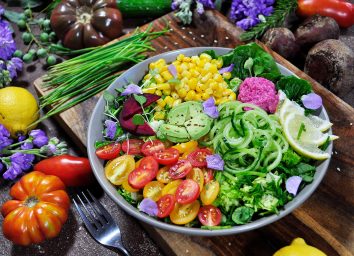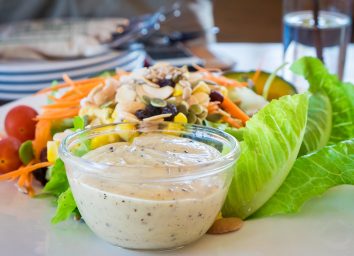What Happens to Your Body When You Eat Salad Every Day

As far as foods go, salad has a superstar reputation, and it’s practically the poster child for weight loss and healthy eating. Whether you’re trying to up your intake of fruits and vegetables, are wanting to shed some pounds, or are simply in the mood for a filling meal that will curb your cravings, you can’t go wrong with a salad. But what happens to your body when you eat a salad every day? We spoke with Gina Keatley, a certified dietitian and nutritionist at Keatley Medical Nutrition Therapy in New York City, to find out.
According to the current Dietary Guidelines for Americans 2020–2025, adults should be eating at least 2.5 cups of vegetables per day. Unfortunately, the CDC reports that only one in ten American adults actually eat their recommended amount of vegetables on a daily basis. Sounds pretty bleak, right? Thankfully, eating a salad every day is an easy way to solve that problem—as long as you’re “eating the rainbow” with a diverse array of vegetables.
Eating the rainbow is a term for eating a variety of fruits and vegetables in order to get as many different health benefits as possible. According to a report published in Critical Reviews in Food Science and Nutrition, various types of produce provide their unique nutrient makeup, energy, and bioactive contents. For example, they note that dark-colored berries, green cruciferous vegetables, and citrus fruits may have a higher impact on preventing chronic disease than other types. So, this isn’t to say that some fruits and vegetables are bad by any means, but that it’s important to eat a variety so you can consume as many helpful nutrients as possible. And one way to get multiple produce items in one dish is with a salad.
“Salads are generally low-starch foods that will help you to regulate your blood sugar better,” says Keatley. “But not all salads are created equal.” As Keatley points out, some fast food salads can pack more than 2,000 calories—which is your entire day’s worth.
“Just because there are some greens in it doesn’t mean it is going to be appropriate for your goals,” she adds. In other words, salads can be a healthy staple in your diet, but if you’re eating them daily, you should be mindful of your ingredients and portion sizes (especially where dressings and fats are concerned).
With all of that in mind, read on to find out what happens to your body and overall health when you eat salad every day. And for even more healthy eating tips, be sure to check out our list of 5 Ways Eating More Plants May Save Your Life in 2023.
You’ll absorb a lot of vitamins.
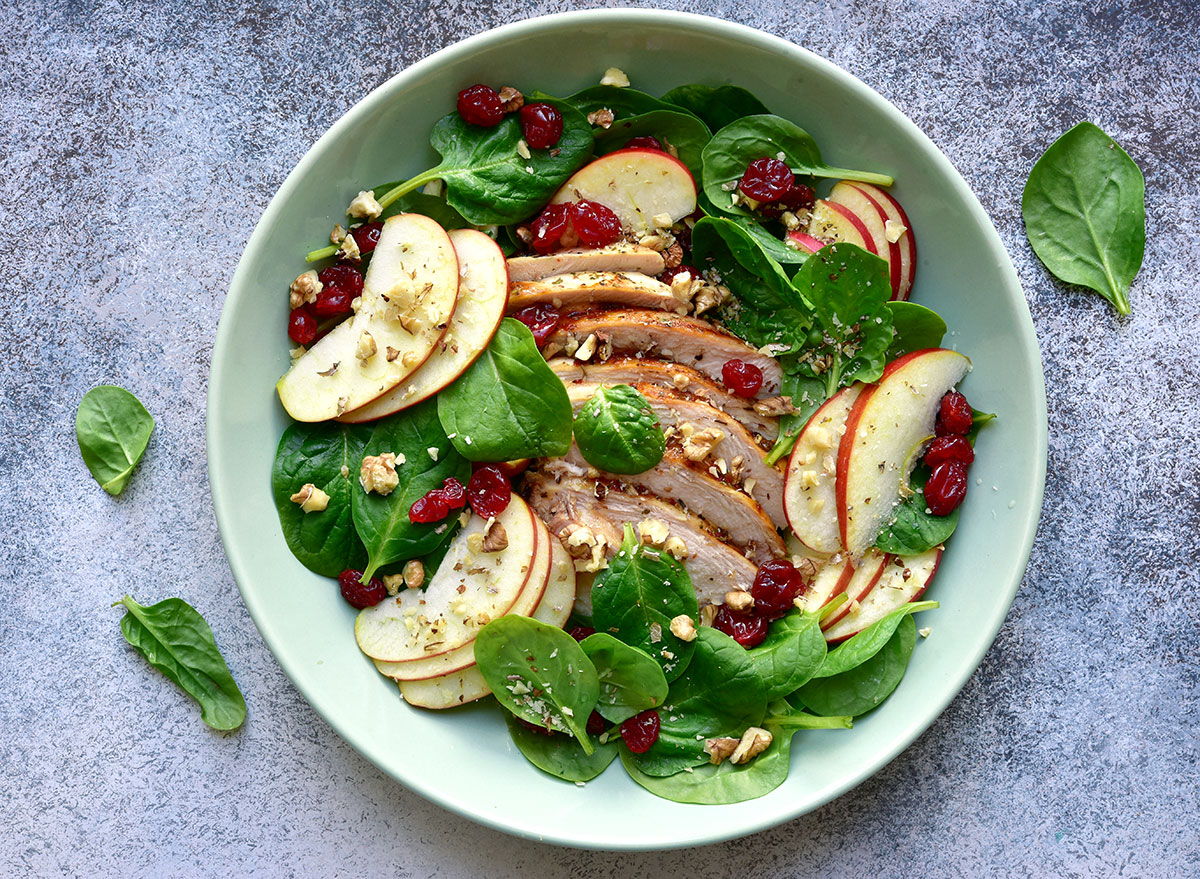
As long as you’re incorporating a wide variety of ingredients (different types of vegetables, fruits, beans, legumes, nuts and seeds, protein sources, etc.) and regularly switching things up, that daily salad can easily be a nutritional powerhouse that supplies many of the vitamins and minerals your body needs.
Better yet, research has shown that the oil in your salad dressing can actually help your body to absorb fat-soluble micronutrients found in fruits and vegetables more effectively. These nutrients include alpha and beta carotene, lycopene, lutein, vitamin E, vitamin K, and vitamin A.
Pro tip: You can build a salad to include helpful immune-boosting vitamins. For example, spinach, kale, and salmon contain vitamin C, and many nuts and seeds—like almonds and sunflower seeds—contain vitamin E, both of which are vitamins that have been found to help keep your immune system healthy.
You might lose weight as a result of eating fewer unhealthy foods.
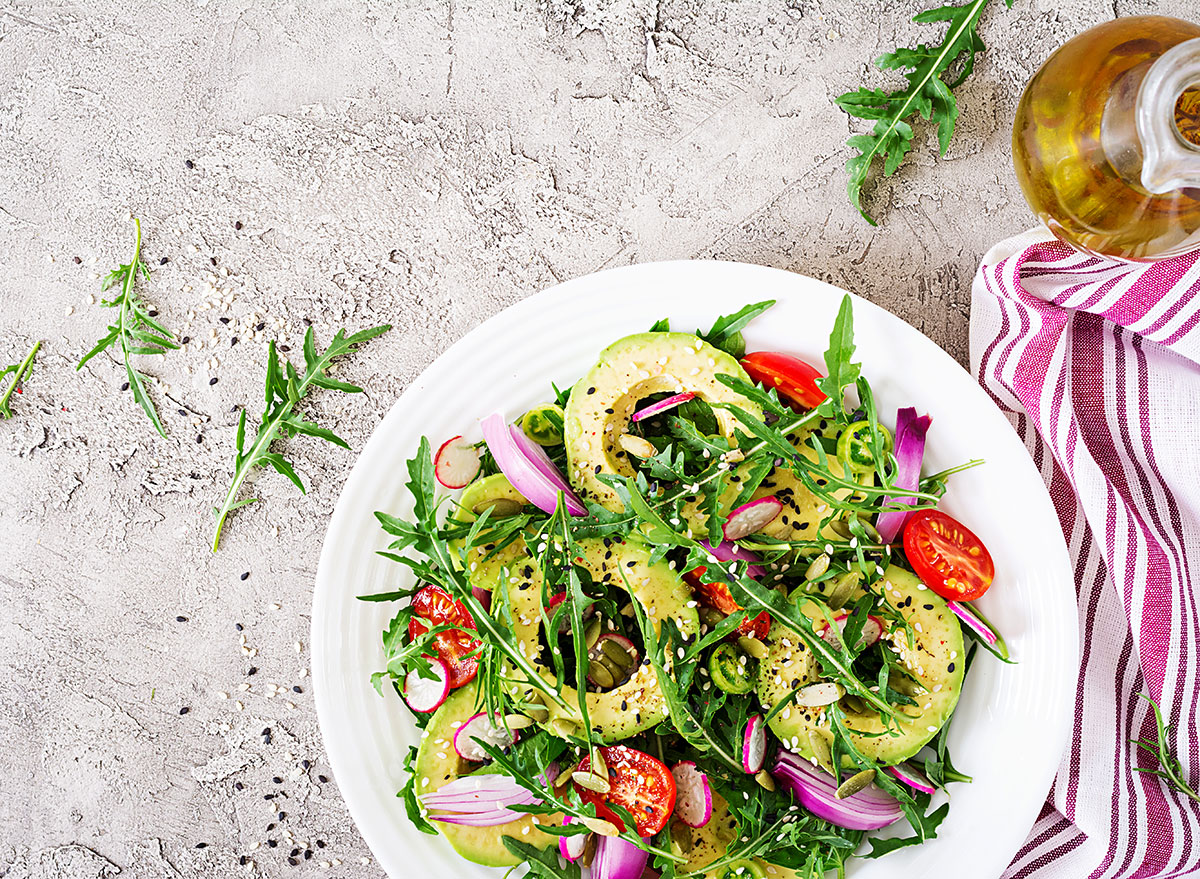
One of the reasons why salad is considered a healthy choice when you’re aiming to maintain your weight or shed pounds is that they are usually chock-full of fiber—which is considered to be helpful in aiding with weight loss. According to a study from The Journal of Nutrition, a high-fiber diet helped adults who were considered overweight or obese to lose weight.
Fiber’s benefit on weight loss is multifaceted. For one, it can help slow down the rate of digestion and make you feel full much longer than foods high in refined carbohydrates or added sugar. This can help you curb cravings and stop from over-indulging on calorie-dense snacks. Another way it can help with your weight loss goals is by promoting a healthier gut microbiome, which has been connected to greater weight loss.
When it comes to eating a salad specifically, a 2004 study found that when people had a small first-course salad before the rest of their meal, they consumed 7% fewer calories, and when they had a large salad beforehand, they consumed 12% fewer calories. So, by always starting your meal with a salad, you may avoid overeating other more calorie-dense foods.
You’ll keep your brain young.
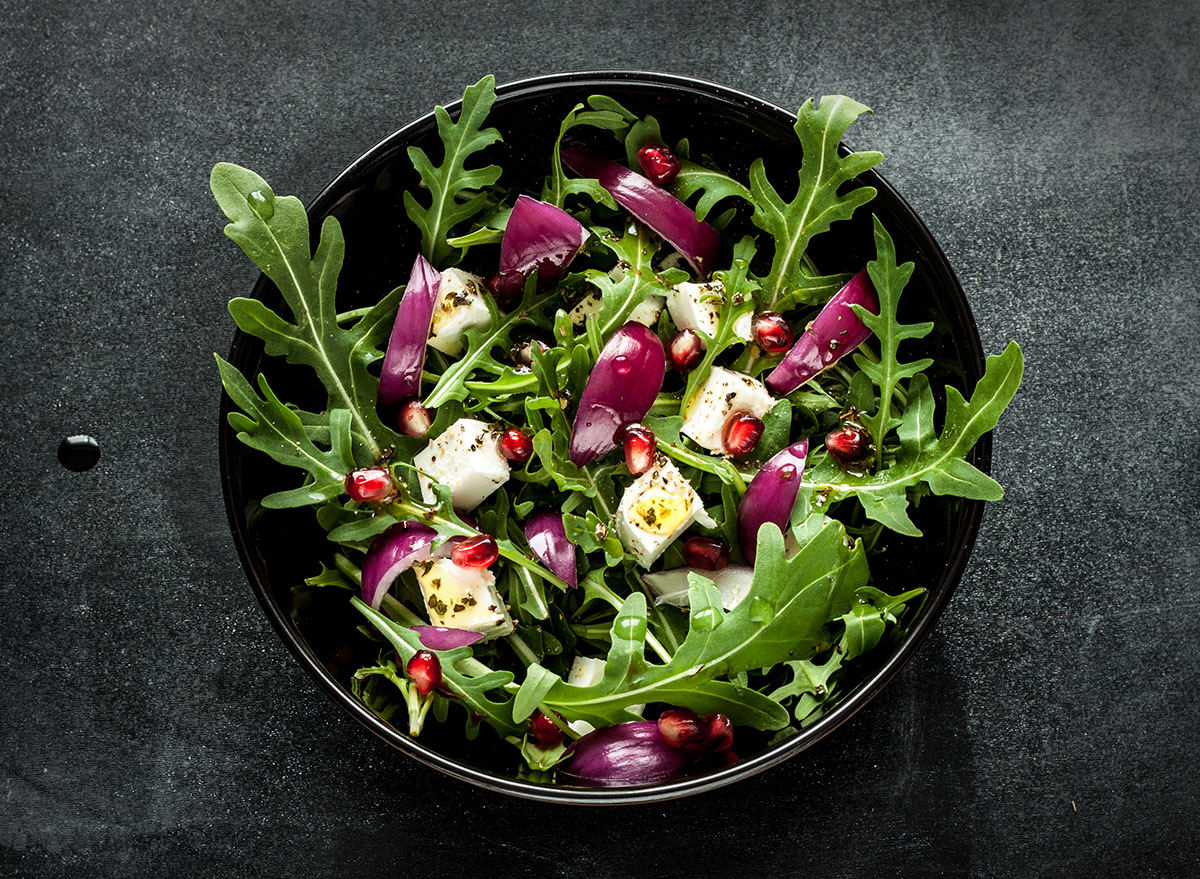
Aiming to eat salad every day is a great way to make sure your brain stays in tip-top shape. In fact, a 2018 study found that eating one daily improved the memory of elderly people by as much as 11 years. Even just half a cup of salad was enough to slow the rate of cognitive decline.
But, keep this in mind: Researchers found that those who specifically ate leafy greens had the memory function of people significantly younger. So, grab some kale, spinach, or collard greens and throw together your ideal salad creation for better brain health.
You could possibly experience some heartburn.
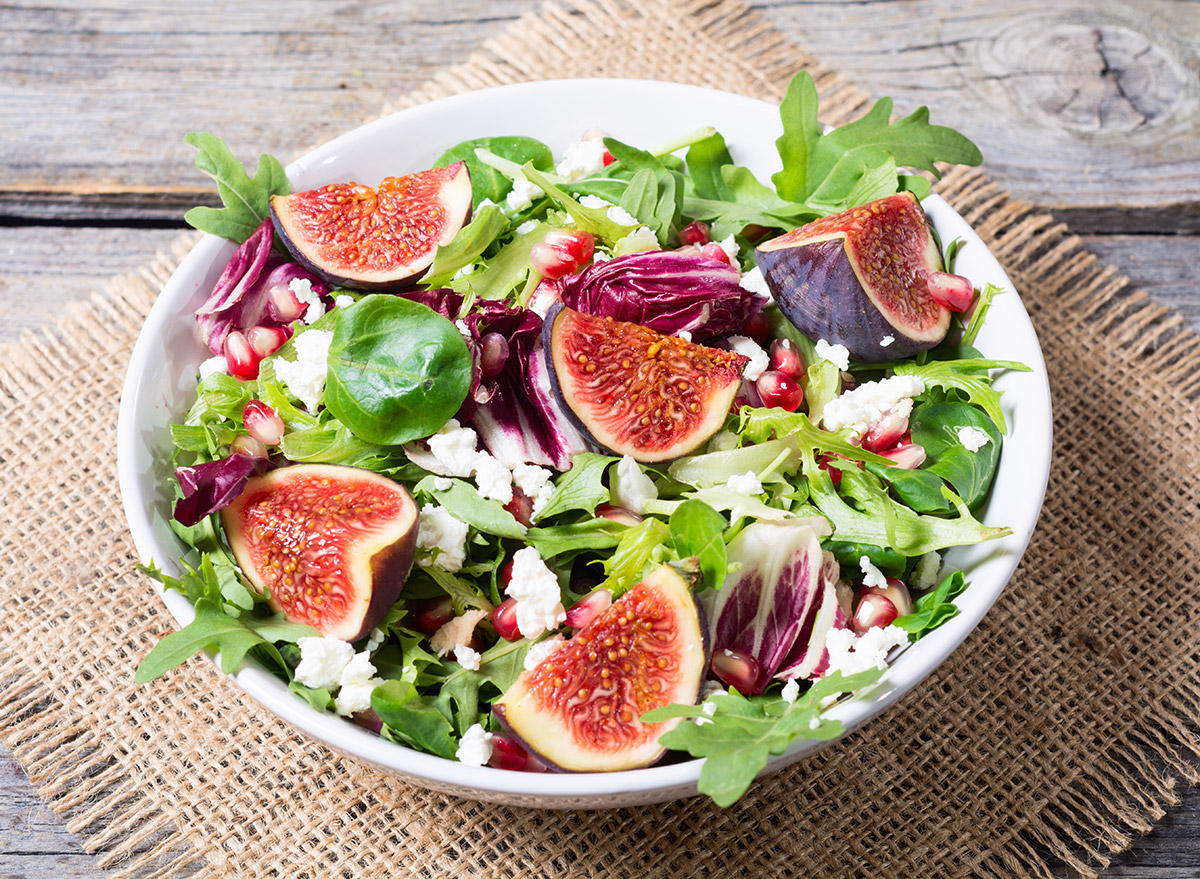
Be careful about loading up on the vinaigrette—not just because the calories can rack up quickly, but also because according to Keatley, the acid in the vinegar can trigger reflux-related symptoms.
“The more salad you eat, the greater the odds are that you’re using more dressing, and too much can lead to heartburn,” explains Keatley.
It’s also worth noting that tomatoes and cheese, both common salad ingredients, are highly acidic and can aggravate acid reflux. If you’re prone to reflux, try a salad dressing that is lower in vinegar, and opt for more gentle toppings like nuts, seeds, fruit, or lentils.
You may feel bloated or gassy—if your portions are large.
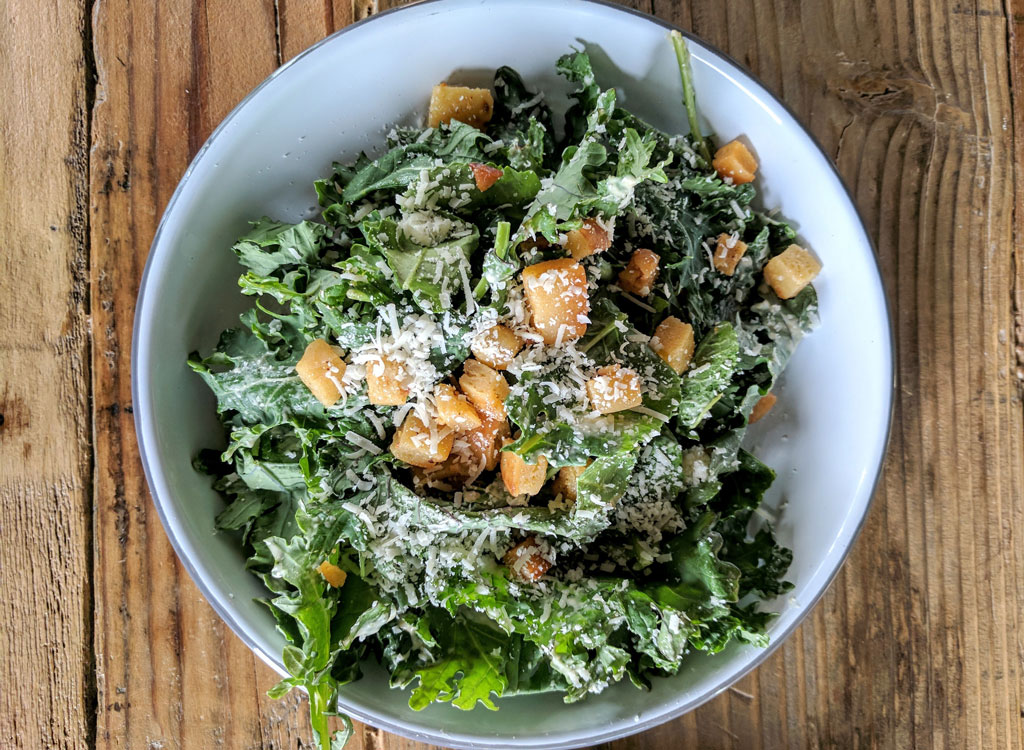
Struggling with bloating or other GI issues after devouring your daily salads? It might be time to consider your portion sizes.
“If you’re getting some of the heartier greens like kale in your salad, you could be dumping a significant amount of insoluble fiber into your colon, which may cause some constipation and become a feeding frenzy for the bacteria down there, which might lead to some gas,” says Keatley.
Luckily, there’s an easy fix: Try just making a smaller salad, at least until your body adjusts.
“You can train your gut just like you train your muscles,” says Keatley.
So, if you’re introducing your body to new foods that are higher in fiber than what your body is used to, you may want to start slowly. That means that even if you eventually want to get to where you can eat salad every day, you may need to start with just a few times a week.
You’ll likely feel more regular.

Speaking of insoluble fiber, Keatley says this type of fiber attracts water as it moves through your digestive tract—thus helping to soften your stools and making them easier to pass. This means that once you’ve given your body time to adjust to this introduction of fiber, your daily salad habit may then help keep constipation at bay.
“But there is a tipping point at about 70 grams of fiber a day,” says Keatley. “At this point, you could be creating intestinal blockages—while this is rare, it shows that more is not always better.”
By the way, insoluble fiber doesn’t just normalize your bowel movements. According to the Mayo Clinic, high-fiber diets lower your risk of colorectal cancer, because when fiber ferments in your colon, it has been found to have a protective effect.
You may live longer.
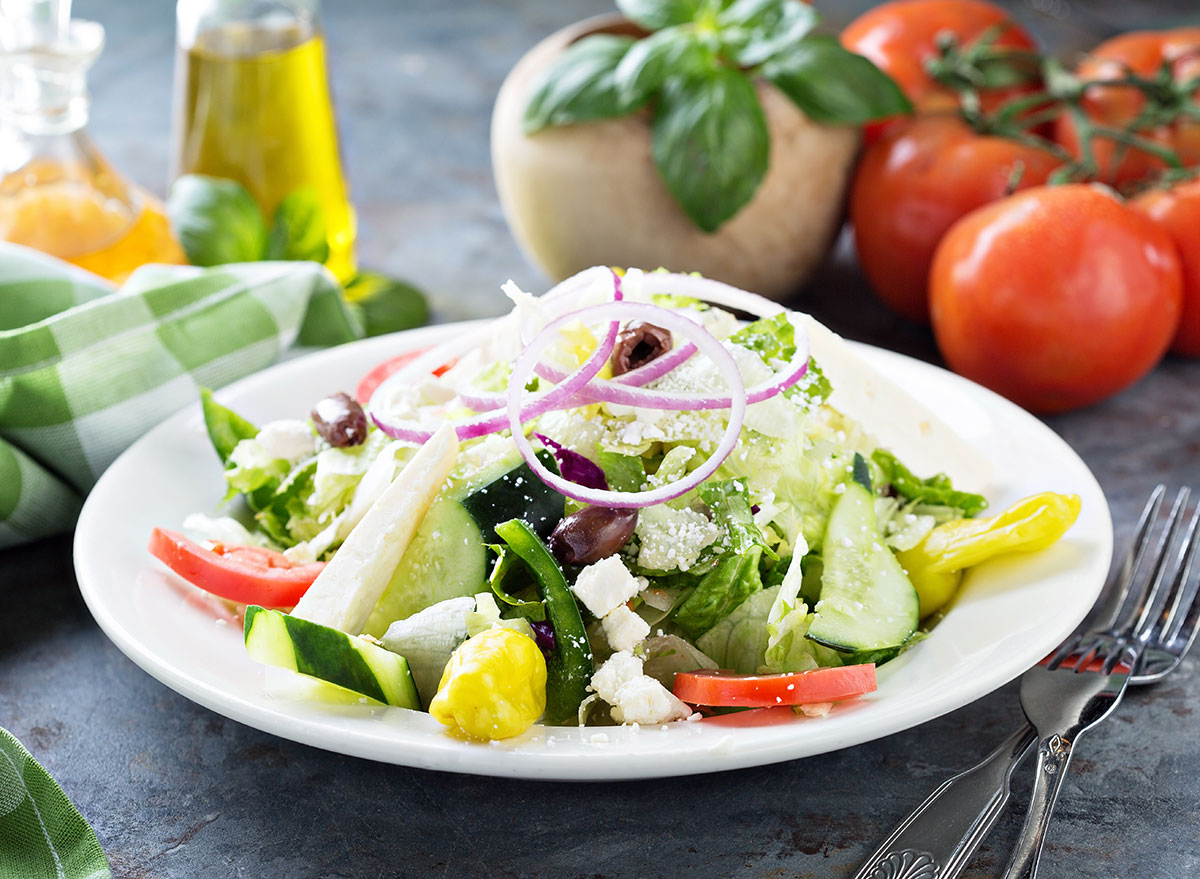
According to Harvard Health, while “no single fruit or vegetable” can provide all of the nutrients your body needs, a variety of produce can ward off a host of diseases. That makes the salad a superb choice for living a long, healthy life.
Need proof? A 2016 meta-analysis published in JRSM Cardiovascular Disease determined that eating more leafy green vegetables was associated with a significantly lower risk of heart disease. Additionally, a 2017 study also suggested that piling on the veggies every day could prevent premature death. They found that eating 10 portions per day was associated with a 24% reduced risk of heart disease, a 33% reduced risk of stroke, a 28% reduced risk of cardiovascular disease, and a 13% reduced risk of total cancer. That’s plenty of reason to eat a salad every day, if you ask us.
A previous version of this story was published on March 16, 2021. It has been updated to include additional copy and proofreading revisions, additional research, and updated contextual links.

